イベント&アクティビティ
UPDATED European-Japanese dialogue on ‘How to deal with China’
 Please note that this event has changed to an online only format. Given China’s indisputable economic and geopolitical importance, China cannot be ignored, passed or de-coupled. It is at the same time a partner, a competitor as well as an ideological and potential military opponent in the evolving multipolar world order. When dealing with China, how should we balance these different relational aspects? How can we maintain a constructive exchange without jeopardizing our own interests? Through a dialogue between European and Japanese China experts, the conference How to deal with China will address these questions from different perspectives. Speakers include Hans van Ess (LMU Munich), Mats Lennart Harborn (Traton China Group), Shigeto Sonoda (University of Tokyo), Osamu Mogi (Kikkoman Corporation), and Junichiro Ikeda (Mitsui O.S.K. Lines). The conference is co-organised by the University of Tokyo’s Global Asian Studies, the Keizai Doyukai, and the DIJ. Details and registration here
Please note that this event has changed to an online only format. Given China’s indisputable economic and geopolitical importance, China cannot be ignored, passed or de-coupled. It is at the same time a partner, a competitor as well as an ideological and potential military opponent in the evolving multipolar world order. When dealing with China, how should we balance these different relational aspects? How can we maintain a constructive exchange without jeopardizing our own interests? Through a dialogue between European and Japanese China experts, the conference How to deal with China will address these questions from different perspectives. Speakers include Hans van Ess (LMU Munich), Mats Lennart Harborn (Traton China Group), Shigeto Sonoda (University of Tokyo), Osamu Mogi (Kikkoman Corporation), and Junichiro Ikeda (Mitsui O.S.K. Lines). The conference is co-organised by the University of Tokyo’s Global Asian Studies, the Keizai Doyukai, and the DIJ. Details and registration here
Hybrid Study Group on education at Japan’s National Defense Academy

After the physical and moral devastation brought by the defeat in the Asia-Pacific War, Japanese administrations in the Cold War era charted a course of gradual rearmament against the backdrop of substantial anti-militarist sentiments among the wider society. This tension placed members of the newly rebranded Self-Defense Forces (SDF) in an uneasy position. This research project examines the institutional socialisation of the SDF’s leadership through a one-year ethnography of Japan’s National Defense Academy (NDA), where the bulk of the future senior officers of the SDF’s three branches are educated. Through this anthropological inquiry, this presentation seeks to answer how history, tradition, and identity of the Japanese SDF are negotiated at the NDA. Details and registration here
DIJ co-organizes Annual Conference of the Japan Economy Network
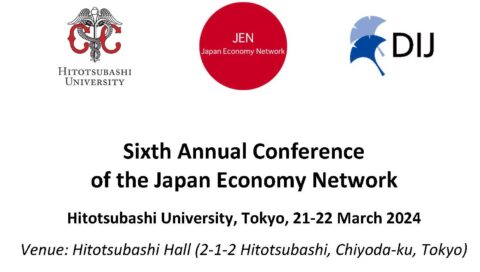 Together with Hitotsubashi University, the DIJ co-organizes this year’s Sixth Annual Conference of the Japan Economy Network (JEN) on March 21-22. The conference features thirty-six speakers in ten sessions, including a dinner keynote speech by Nobuko Nagase (Ochanomizu University), chaired by DIJ economist Markus Heckel. DIJ advisory board member David Chiavacci (University of Zurich) will give a presentation on “Transnationalism and foreign workers in Japan: Between state policies and market forces”. The full programme is available here (PDF).
Together with Hitotsubashi University, the DIJ co-organizes this year’s Sixth Annual Conference of the Japan Economy Network (JEN) on March 21-22. The conference features thirty-six speakers in ten sessions, including a dinner keynote speech by Nobuko Nagase (Ochanomizu University), chaired by DIJ economist Markus Heckel. DIJ advisory board member David Chiavacci (University of Zurich) will give a presentation on “Transnationalism and foreign workers in Japan: Between state policies and market forces”. The full programme is available here (PDF).
DIJ Newsletter Winter 2023/24
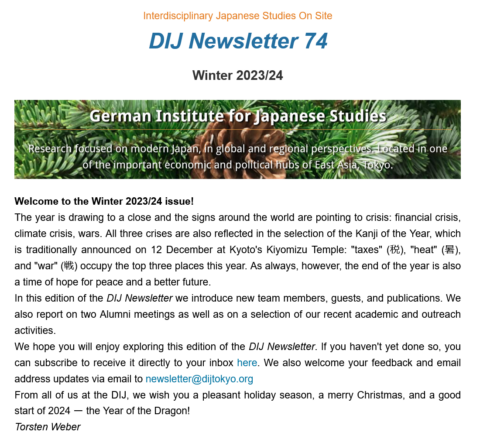 In the winter issue of our DIJ Newsletter we introduce new team members, guests, and publications. We also report on two Alumni meetings as well as on a selection of our recent academic and outreach activities. We hope you will enjoy exploring this new edition of the DIJ Newsletter. If you haven’t done so yet, you can subscribe to receive our Newsletters directly to your inbox. The full issues and subscription form are available here.
In the winter issue of our DIJ Newsletter we introduce new team members, guests, and publications. We also report on two Alumni meetings as well as on a selection of our recent academic and outreach activities. We hope you will enjoy exploring this new edition of the DIJ Newsletter. If you haven’t done so yet, you can subscribe to receive our Newsletters directly to your inbox. The full issues and subscription form are available here.
Season’s Greetings and best wishes for the New Year
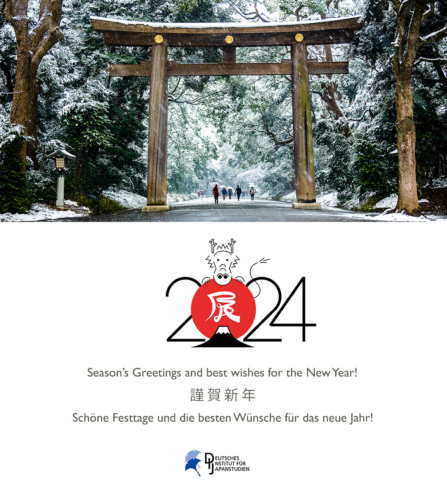
Das Deutsche Institut für Japanstudien wünscht erholsame und frohe Festtage und einen guten Start in ein erfolgreiches Jahr des Drachens!
The German Institute for Japanese Studies wishes you a happy holiday season and a successful Year of the Dragon!
ドイツ日本研究所一同、皆様のご多幸と来るべき新年が成功の年になることを祈念いたします。
Now Open Access: book publication ‘Research into Japanese Society’ co-edited by Sebastian Polak-Rottmann
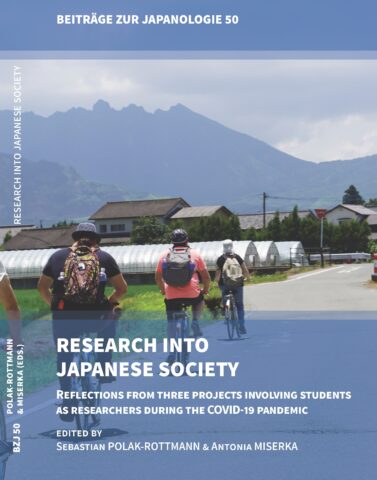
How can researchers conduct fieldwork during a pandemic? And how can students contribute actively to the collaborative production of knowledge? The new open access publication Research into Japanese society: Reflections from three projects involving students as researchers during the COVID-19 pandemic (University of Vienna 2023), co-edited by Antonia Miserka and DIJ’s Sebastian Polak-Rottmann, collects three group projects from Sophia University, the University of Vienna and FU Berlin that involve students as researchers at different stages in their academic lives. In all three cases, students actively participated in gathering data for a group project and reflected on their experiences. The volume also demonstrates how research in a team can be conducted, albeit in an adjusted manner, during a pandemic. The fifteen contributions include a chapter co-authored by Sebastian and DIJ alumnus Hanno Jentzsch (“Rural spaces, remote methods—the virtual Aso Winter Field School 2022”) and a conversation between Sebastian and John W. Traphagan (University of Texas at Austin) on his book Cosmopolitan Rurality, Depopulation, and Entrepreneurial Ecosystems in 21st-Century Japan.
David M. Malitz analyses Japan’s diplomatic reaction to the war in the Middle East
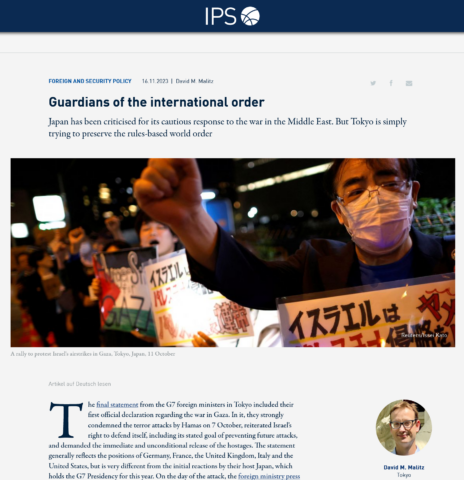
The online journal International Politics and Society (IPS) has published an article by DIJ researcher David M. Malitz analysing Japan’s diplomatic reaction to the war in the Middle East. In “Guardians of the international order”, David explains that some of the criticism Japan has received for its cautious response to the war is undeserved. As he writes, it would “be wrong to play up or misinterpret why Japan did not sign the ‘Joint Statement on Israel’ with Germany, the United Kingdom, France, Italy and the United States on 9 October. Japan could not back the phrase ‘our countries will support Israel in its efforts to defend itself’ because its law prohibits exporting weapons.” Notwithstanding, high-ranking Japanese diplomats condemned the ‘terror attacks’ by Hamas and ‘expressed solidarity with the Israeli people’. “Japan has again demonstrated that it shares the same values and that its main concern is maintaining the rules-based international order”, David concludes. The article is also available in German here.
DIJ-Direktor Franz Waldenberger im Radio-Interview zur japanischen Schuldenpolitik

Japan gilt als Industrieland mit der höchsten Staatsverschuldung: die pro-Kopf-Verschuldung liegt mehr als doppelt so hoch verglichen mit Deutschland. Kann Deutschland von Japan beim Schuldenmachen lernen? Im Interview mit Deutschlandfunk Kultur erklärte DIJ-Direktor Franz Waldenberger, dass die expansive Finanzpolitik Japans nicht den Haushalt aufgebläht habe, sondern dadurch in Japan besonders unpopuläre Steuererhöhungen vermieden werden konnten. Außerdem habe es ökonomisch sinnvolle Gründe für die Verschuldung gegeben, wie das niedrige Zinsniveau, die hohe Sparquote und eine Stimulation der Inlandsnachfrage. Für Deutschland empfahl Waldenberger eine möglichst pragmatische Herangehensweise an das Schuldenmachen. Das Interview kann hier nachgehört werden.

















 Open Access
Open Access
